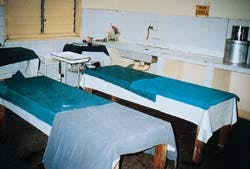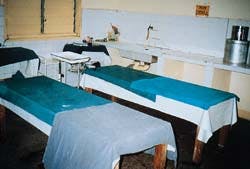Offshore Petroleum Operations Good information cuts medical risk of travel
J. David Clyde, MD
ARCO International Oil & Gas Co.
Plano, Tex.
This is an example of an emergency room in West Africa (Fig. 1).
Today the oil industry is seeking exploration, production, and business opportunities around the globe. A result is that its employees are traveling more and visiting distant and remote locations. This travel significantly increases the level of their exposure to illness and accident.
These international travelers are returning with tales of illness picked up on a trip. The most frequent one is about diarrhea. This brings on some serious questions: Is it from a virus, food poisoning, or some exotic bacterial intestinal infection? All should be taken seriously even though the condition is often described colloquially and somewhat lightly as, for example "the trots."
Important questions
Asking and getting the answers to some important questions will cut the health risks of necessary business travel and keep the business traveler from becoming a victim as an "adventurous tourist" on weekends or holidays while overseas.
Travel should get the same scrutiny that new business ventures do. A good executive would not invest in a new business without first researching the potential investment. An oil company would not drill an exploration well without first investigating geology or seismic data, and an engineer would not design a production platform without first studying and understanding specifications needed for the project.
Preparation for travel
But many business travelers depart to visit an unknown country without preparation or an understanding of the health and safety risks that exist there. They can, and should, reduce their health risks by getting information before departure on three major aspects of the trip: the country to be visited, the medical situation there and ways to cope with it, and planning on an emergency.
Country information
As you plan your trip, consider the following questions:
1. What are the local customs in this area?2. What is the political situation?
3. What is the language spoken? Do you speak this language or can you learn a few useful words such as a greeting or the word for toilet?
4. What are the local business expectations, protocols, and courtesies?
A traveler armed with such information can avoid a great deal of stress in exotic or remote locations.
Medical preparation
Now that you know about the country, the next step is to take a full personal health inventory: Do you have any health conditions which may worsen during travel? For example, stable coronary heart disease in your usual work routines may become unstable during travel due to fatigue, jet lag, hot airports, long waits at immigration, or rushing to make a flight connection.
Diabetes, particularly the insulin-dependent type, requires skill, knowledge of the disease, and a cooperative effort by the patient and his/her physician to modify dosage and accommodate time zone changes.
Travel during pregnancy can expose the expectant mother to extreme risks. In a medically deficient area, a miscarriage may result in severe life-threatening hemorrhage or infection. Premature labor without adequate medical services may result in delivery of a premature infant, and without intensive care the baby may die. Travel during pregnancy can also expose the mother to "blood clot" formation in the legs, and other complications.
If you take regular medications, be sure to have your medicines in properly labeled bottles to avoid a challenge from customs officials. Take an extra supply of medication in case you experience travel delays. Many medicines frequently used in the U.S. are either not available abroad or, in some areas, are of questionable quality.
Make sure your dental care is up to date before travel and avoid dental care in most developing countries. Often standards of hygiene do not equal those in most industrialized countries, and in some places, quality of dental training is not adequate.
Country disease risks
What are the disease risks for the country you will visit? A rule of thumb is that the lower the scale of industrial development a country has, the more disease risks you will encounter. This is logical when you consider that lesser-developed countries tend to have less capital to spend on education and public health services.
Diseases thrive in conditions where low education and poor public health services exist. These diseases are transmitted through unsanitary practices and result in significantly increased morbidity and mortality statistics.
Many resources are available to learn about the potential exposure risks. The Centers for Disease Control (CDC) in Atlanta, Ga., provide publications and automated telephone information services for travelers (see note at end of the article). Several travel medicine clinics have physicians who can assist in travel preparation, and some forward-thinking companies provide internal medical resources to educate and prepare travelers.
Unfortunately, because travel health risks are not appreciated by some business managers, many people are exposed to unnecessary risks and disease in the line of duty. Many hours and days of productive work time are lost because of illness acquired during travel.
Immunizations
The question of what immunizations to take before travel can be difficult to answer. Will your travels take you only to large cities? Will you conduct business only in western-style hotels? Will you travel to rural or remote areas with less-sophisticated accommodations and food service? The answer to these questions will determine the need for certain immunizations.
Confusion exists in the medical advice given to travelers. Much of it is due to the lack of sufficient information about regional disease risks. Good disease data are difficult to obtain for many areas of the world, and physicians differ on interpretation of the data available. One classic example is which prophylactic (preventive) medicine should a traveler take for malaria when visiting the tropics? The answer depends to a large degree upon the doctor's background.
An American doctor might say LariumRegistered weekly beginning 1-3 weeks before travel and weekly through 4 weeks after return home.
A British doctor might say chloroquine weekly beginning 1 week before travel through 4 weeks after returning plus PaludrineRegistered twice daily.
A French doctor might prescribe chloroquine at a lower daily dosage through 4 weeks after return plus PaludrineRegistered twice daily.
Scientific data are not available to prove one regimen superior to another. In the middle of the confusion, many travelers stop their medicines and "take their chances" only later to discover they were exposed to malaria and developed the disease after returning home.
Poor sanitary conditions
Many diseases exist in poor sanitary conditions. Such things as hepatitis A, hepatitis B, malaria, cholera, typhoid fever, polio, and leishmaniasis (a parasitic disease transmitted by the bite of sand flies) are common diseases resulting from poor sanitation. The entire list and description of these possible diseases fill large medical textbooks.
Many can be avoided by a simple commonsense approach. Wash and dry your hands after using the toilet. Adequate heating kills bacteria, viruses, and many toxins that can make you sick. So eat food that is steaming hot. Avoid raw meats and seafoods because many parasites and bacteria may be present in improperly prepared meats.
Contaminated bodies of water are frequently the source of "fresh" items on the menu. Vegetables should also be steaming hot to prevent transmission of some infections. Fruits that you peel are safe.
Salads are risky. The "fertilizer" used to grow these leafy vegetables is a contamination source as well as the "dirty" hands of the person preparing the salad.
Water and alcohol
Many areas have inadequate water treatment standards. A good rule is to drink bottled water until you can get reliable information about the local resources. Bottled water "with gas" is more acidic and limits the growth of "germs" more than flat water. It also requires a commitment from the local supplier to carbonate water.
Remember, do not brush your teeth in tap water! This is a quick way for germs to get into your system. Also, remember no ice in your drinks. Cold does not kill germs, and the ice frequently is made from the contaminated water. Forget this rule and you may become the next diarrhea candidate.
Watch the alcohol intake. Alcohol impairment has led to poor choices for food, activities, and can be a source of "intentional poisoning." Male travelers have been lured into having an "innocent" drink with an attractive local at a bar. One common trick is to spike the drink with clonidine, a drug used for blood pressure control. When given to anyone with normal blood pressure, the medicine causes a significant drop in the blood pressure, severe muscular weakness, and inability to fight, run, or think clearly. The victim is defenseless for some time. After the traveler regains his senses, he discovers that he has been robbed-money, credit cards, or business information.
Business tourist
The business traveler generally has "deadtime," periods without appointments, such as on weekends or during local holidays. This is the time when the business traveler often turns into a tourist, sightseeing, exploring, and hiking. This is also the time to avoid becoming the adventurous tourist. That cold clear mountain stream water may harbor a dangerous fungus or virus. Poisonous snakes abound in the tropics and there is always the threat of rabid dogs and animals anywhere in the wild.
Auto accidents
Auto accidents represent the highest risk for travelers, with taxi cabs leading the list. Poor maintenance, unsafe driving habits, high speed, and the lack of seat belts all contribute to these risks.
If New York cab drivers get your heart racing, you are not prepared for international travel. You must give the driver instructions for your safety. If he is driving too fast, demand that he slow down. If there is no initial response to your request, tell him to slow down or you will not pay him. This usually works, but you may find it necessary to be forceful.
Medical emergencies
What happens if you are injured or become ill while traveling? Whom do you call? Where do you go for medical care? Good travel preparation requires asking and getting answers to these questions.
Many developing countries lack emergency response capabilities. If they have an ambulance, frequently it is poorly equipped. When you arrive at the "emergency room" of the hospital, the absence of equipment and supplies will quickly become evident even, to the medically untrained (Fig. 1).
Some facilities have well-trained physicians but lack equipment and supplies. Others have physicians with weak emergency response skills, and in still other areas, the best medical care facility may not be open "politically" for the treatment of "foreigners."
Should a severe illness or accident occur, each traveler should know who to call for advice or where to go for care. Many hotels in developing countries retain the services of some of the best local physicians to assist their clientele. Your local business contacts may be able to help guide you to the better local resources.
Many companies contract with evacuation services to provide medical advice, emergency care, or air ambulance transportation for employees needing urgent care that is not locally available. In fact, an individual can buy insurance directly from international assistance companies that provides a variety of services, including medical evacuation.
Before departure, each traveler should become familiar with information about the local medical resources for the travel area and develop a plan for an emergency. Travelers should plan for the worst and hope for the best. Good preparation continues to be a mark of the successful business. Be a successful traveler-plan well, avoid unnecessary risks, and at the end of the day return home-healthy.
Note: Health Information Resources:
Centers for Disease Control (CDC), Travelers Information Service Voice: (404) 332-4555; Fax: (404) 332-4565; CDC internet Site: http://www.cdc.gov/
Medical College of Wisconsin International Travelers Clinic Internet Site: http://www.intmed.mcw.edu/ITC/html
The Author
J. David Clyde, MD is medical director of ARCO International Oil & Gas Co., Plano, Tex. Prior to joining ARCO, he worked in corporate medicine in Lake Charles and Houston for Conoco Inc. He took this position after 12 years in private practice in Anderson, S.C.Copyright 1996 Oil & Gas Journal. All Rights Reserved.Clyde earned a Doctor of Medicine degree from the Medical University of South Carolina, Charleston, after graduating with an undergraduate degree in biology from Furman University. His experience also includes training in occupational medicine at the University of Cincinnati. He has traveled extensively internationally to make preparation for international workers and travelers.
Clyde is a member of the International Society of Travel Medicine, the International Commission on Occupational Health, and the Corporate Council on International Health. He is a fellow of the American College of Occupational and Environmental Medicine, and is an officer in the Texas Occupational Medicine Association. He is now serving on the health subcommittee of the Society of Petroleum Engineers International health, safety and environment conference.


